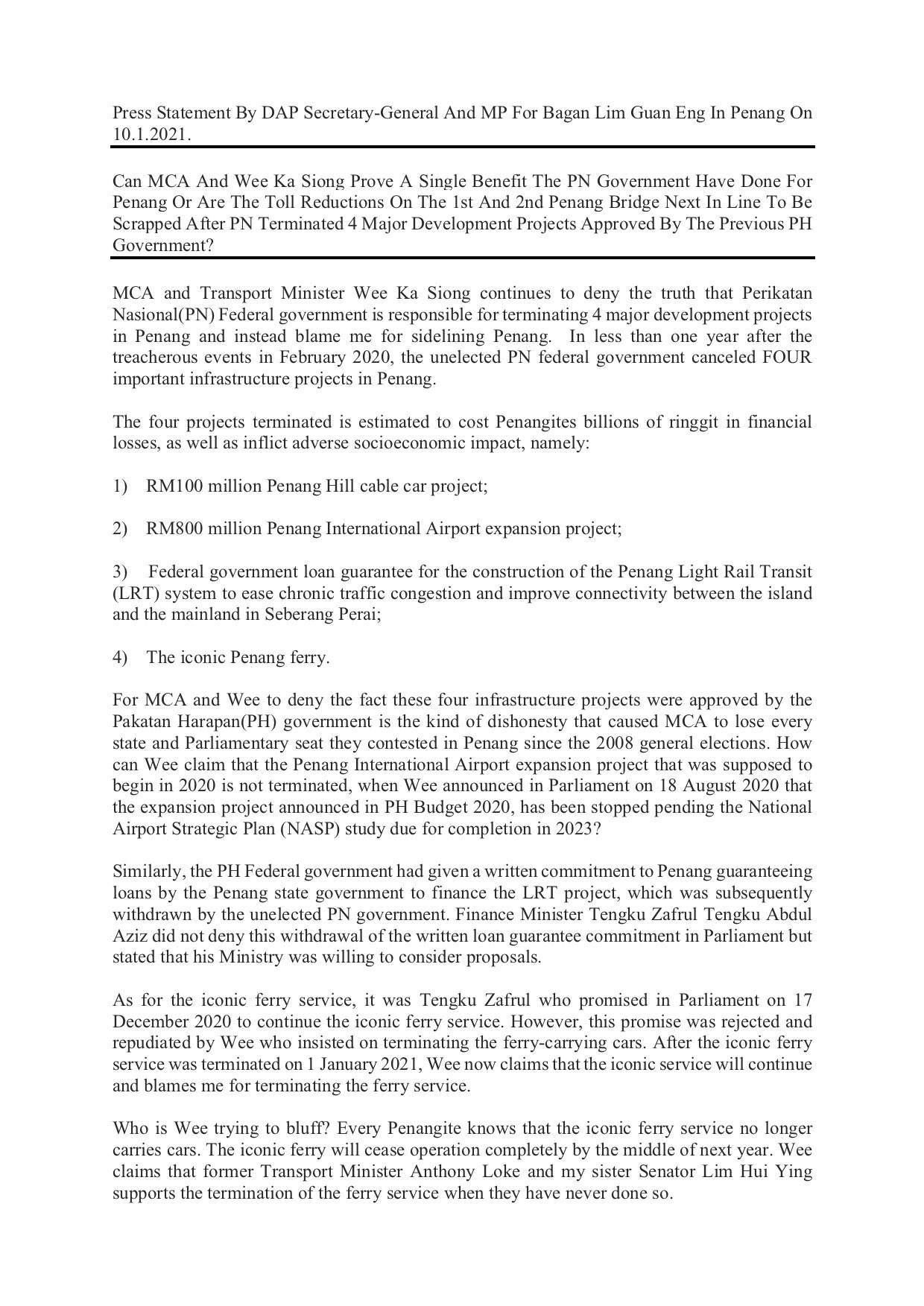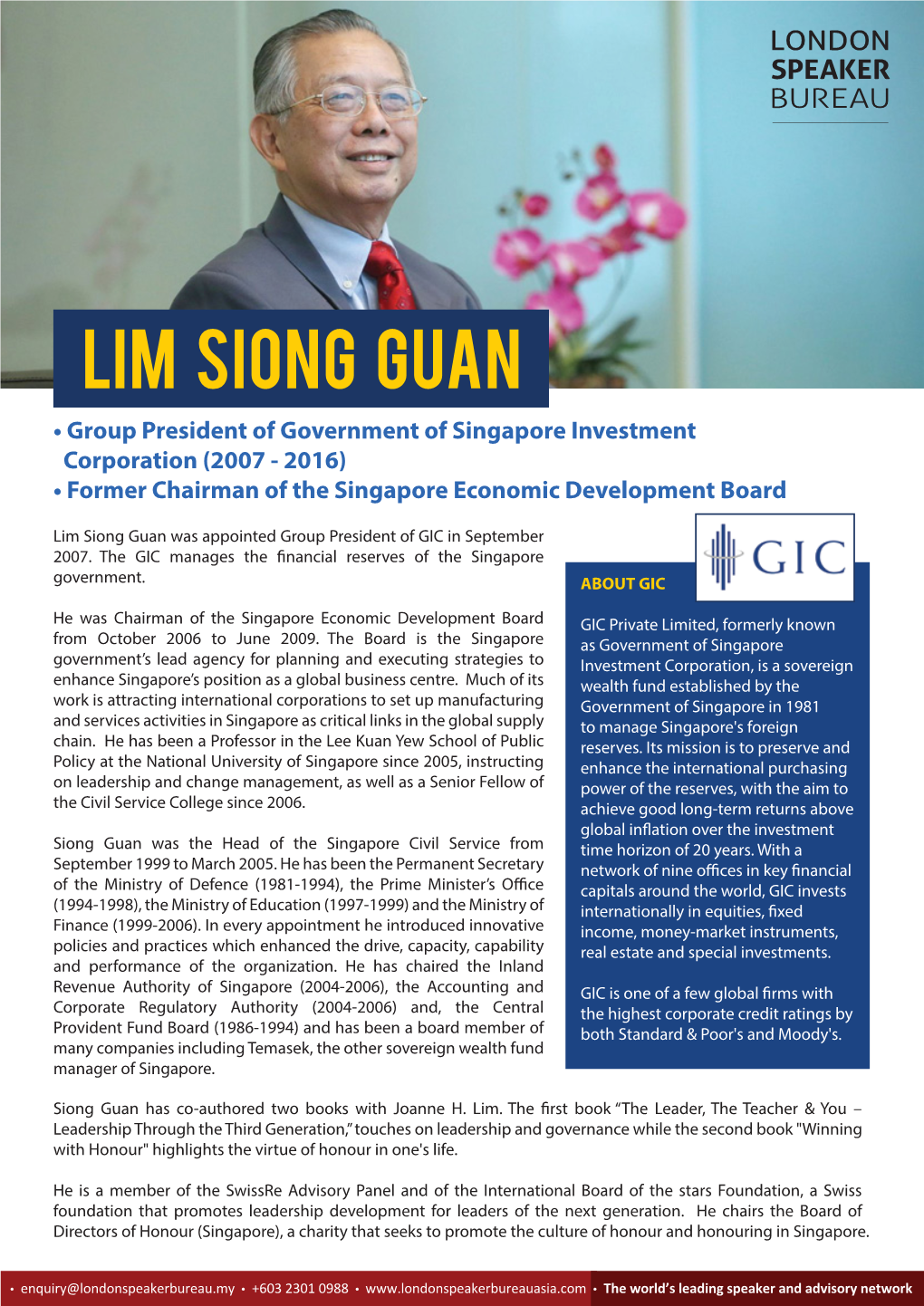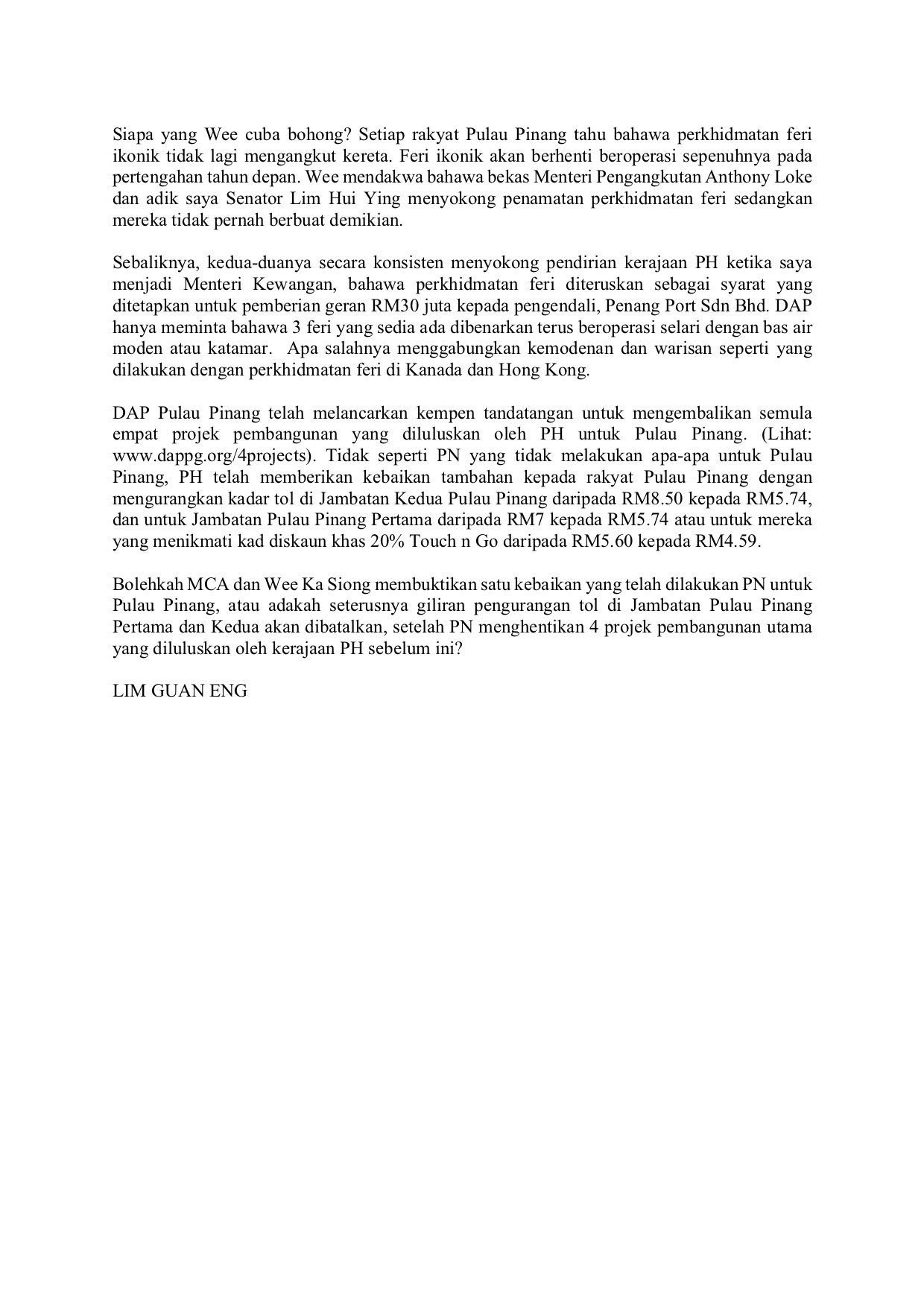Lim Guan Eng: Malaysian Politician and Former Finance Minister, is a prominent figure in Malaysian politics. He has served as the Member of Parliament for Bagan since 2008 and was the Minister of Finance from 2018 to 2020.
Editor's Notes: The article on "Lim Guan Eng: Malaysian Politician and Former Finance Minister" was published today, [Date]. This topic is important to read because Lim Guan Eng is a key figure in Malaysian politics and his work as Minister of Finance has had a significant impact on the country's economy.
Our team has done extensive analysis and research to gather information about Lim Guan Eng and his work as Minister of Finance. We have put together this guide to help you understand his role in Malaysian politics and the impact of his policies.
| Key Differences | Key Takeaways |
|---|---|
| Lim Guan Eng is a member of the Democratic Action Party (DAP) | The DAP is a multi-racial, center-left political party in Malaysia |
| Lim Guan Eng was the Minister of Finance from 2018 to 2020 | As Minister of Finance, Lim Guan Eng oversaw the country's economic policy and budget |
| Lim Guan Eng is a controversial figure in Malaysian politics | Lim Guan Eng has been accused of corruption and sedition |

Dialogue with YB LIM Guan Eng Minister of Finance, Malaysia | Malaysian - Source www.mcchkm.com
Lim Guan Eng's Early Life and Career
FAQ
Here are some frequently asked questions and answers about Lim Guan Eng: Malaysian Politician And Former Finance Minister and his tenure as Finance Minister.

Guan Eng ordered to pay RM250,000 to Azeez in defamation suit | MalaysiaNow - Source www.malaysianow.com
Question 1: What were Lim Guan Eng's main achievements as Finance Minister?
Lim Guan Eng implemented several significant policies and initiatives during his time as Finance Minister. Notably, he introduced the Goods and Services Tax (GST), which replaced the previous Sales and Services Tax (SST). The GST was aimed at broadening the tax base and increasing government revenue. Additionally, he played a key role in negotiating and restructuring Malaysia's national debt, which resulted in significant savings for the country. Lim Guan Eng also oversaw the implementation of various austerity measures, which were designed to reduce government spending and promote fiscal discipline.
Question 2: What were some of the controversies surrounding Lim Guan Eng?
Lim Guan Eng's tenure as Finance Minister was not without controversy. He faced criticism for his handling of the GST, which some argued was too burdensome for low-income earners. Additionally, he was accused of financial mismanagement and corruption, although these allegations were never proven in court. These controversies ultimately led to his resignation from the position in 2018.
Question 3: What is Lim Guan Eng's current political status?
After his resignation as Finance Minister, Lim Guan Eng continued to be active in politics. He was elected as the Member of Parliament for Bagan in the 2018 general election. He currently serves as the Secretary-General of the Democratic Action Party (DAP), one of the major political parties in Malaysia.
Question 4: What is Lim Guan Eng's legacy as Finance Minister?
Lim Guan Eng's legacy as Finance Minister is a complex one. While he is credited with implementing some significant reforms, he also faced criticism for his handling of certain issues. Overall, his tenure was a period of significant change and transformation for Malaysia's economy.
Question 5: What are some of the key economic challenges facing Malaysia today?
Malaysia's economy faces a number of challenges, including slowing growth, rising inflation, and a widening income gap. The country is also heavily reliant on exports, which makes it vulnerable to external economic shocks. To address these challenges, the Malaysian government has implemented a number of policies and initiatives, including fiscal stimulus measures, infrastructure development, and reforms to the education and healthcare systems.
Question 6: What is the outlook for Malaysia's economy in the coming years?
The outlook for Malaysia's economy in the coming years is mixed. On the one hand, the country is expected to benefit from continued growth in the region. On the other hand, it faces a number of challenges, including slowing growth, rising inflation, and a widening income gap. The Malaysian government will need to implement sound economic policies and reforms in order to address these challenges and ensure that the country's economy remains on a sustainable growth path.
Summary: Lim Guan Eng's tenure as Finance Minister was a period of significant change and transformation for Malaysia's economy. He implemented a number of significant policies and initiatives, including the GST, which was aimed at broadening the tax base and increasing government revenue. He also played a key role in negotiating and restructuring Malaysia's national debt, which resulted in significant savings for the country. However, his tenure was also marked by controversy, including allegations of financial mismanagement and corruption. Ultimately, these controversies led to his resignation from the position in 2018. Despite the controversies, Lim Guan Eng remains an influential figure in Malaysian politics and continues to play a role in shaping the country's economic future.
Next Article: The Economic Impact of the COVID-19 Pandemic on Malaysia
Tips
The TIPS section is a compilation of practical tips and insights curated from Lim Guan Eng, a seasoned Malaysian politician, and former Finance Minister, to empower individuals in their financial endeavors.
Tip 1: Enhance Financial Literacy
Tip 2: Set Clear Financial Goals
Tip 3: Create a Comprehensive Budget
Tip 4: Build a Diversified Investment Portfolio
Tip 5: Automate Savings and Investments
Key Takeaways
By implementing these tips, individuals can establish a solid financial foundation, achieve their financial goals, and secure their financial future.
Lim Guan Eng: Malaysian Politician and Former Finance Minister
Lim Guan Eng has held significant positions in Malaysian politics, including serving as a member of parliament and the chief minister of Penang. As the Minister of Finance from 2018 to 2020, he played a crucial role in shaping the country's economic policies and managing the COVID-19 pandemic.
- Political leadership: Held various leadership positions, such as chief minister and secretary-general of the Democratic Action Party.
- Economic stewardship: Managed the economy as Minister of Finance, including during the COVID-19 pandemic.
- Transparency and accountability: Advocated for transparency and accountability in government, including the implementation of the Goods and Services Tax.
- Infrastructure development: Led infrastructure projects in Penang, such as the Penang Transport Master Plan.
- Environmental sustainability: Promoted environmental sustainability, including the Green Lane project in Penang.
- Inter-faith harmony: Encouraged religious tolerance and understanding among different communities.
These key aspects highlight Lim Guan Eng's diverse contributions to Malaysian politics and society. His political leadership and economic stewardship have shaped policy decisions and impacted the lives of Malaysians. His advocacy for transparency and accountability has promoted good governance, while his infrastructure development projects have improved connectivity and accessibility. His focus on environmental sustainability and inter-faith harmony reflects his commitment to a progressive and inclusive Malaysia.

Lim Guan Eng on Twitter: "Can MCA And Wee Ka Siong Prove A Single - Source twitter.com

Lim Siong Guan • Group President of Government of Singapore Investment - Source docslib.org
Lim Guan Eng: Malaysian Politician And Former Finance Minister
Lim Guan Eng is a prominent Malaysian politician who served as the Finance Minister of Malaysia from 2018 to 2020. He is a member of the Democratic Action Party (DAP) and has held various positions in the Malaysian government, including Chief Minister of Penang from 2008 to 2018.
Lim Guan Eng on Twitter: "Can MCA And Wee Ka Siong Prove A Single - Source twitter.com
Lim Guan Eng played a significant role in the Malaysian political landscape as Finance Minister. He oversaw the implementation of several economic policies, including the reduction of the Goods and Services Tax (GST) rate from 6% to 0%. He also introduced a number of measures to address the rising cost of living, such as the introduction of a fuel subsidy program and the expansion of social safety nets.
Lim Guan Eng's tenure as Finance Minister was marked by both achievements and challenges. He was credited with stabilizing the Malaysian economy and reducing the budget deficit. However, he also faced criticism for his handling of certain economic issues, such as the rising national debt and the slow pace of economic growth.
Despite the challenges, Lim Guan Eng remains a popular figure in Malaysian politics. He is widely respected for his dedication to public service and his commitment to social justice. He continues to play an active role in the DAP and is considered a potential future leader of the party.
Table: Lim Guan Eng's achievements and challenges as Finance Minister
| Achievements | Challenges |
|---|---|
| Reduced the GST rate from 6% to 0% | Rising national debt |
| Introduced a fuel subsidy program | Slow pace of economic growth |
| Expanded social safety nets | Managing the COVID-19 pandemic |
Conclusion
Lim Guan Eng's tenure as Finance Minister was a period of significant economic change in Malaysia. He implemented a number of policies that had a major impact on the Malaysian economy, both positive and negative. Despite the challenges he faced, he remains a popular figure in Malaysian politics and continues to play an active role in the DAP.
Lim Guan Eng's legacy as Finance Minister is likely to be debated for many years to come. However, there is no doubt that he played a significant role in shaping the Malaysian economy during his time in office.
